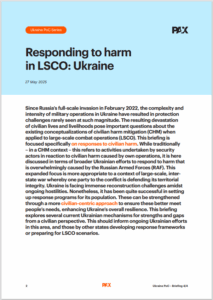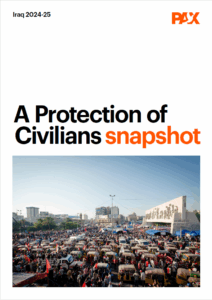Time for transparency
‘Hawija’ demonstrates the need for improved standards for transparency and accountability regarding the impact on civilians of Dutch use of force
Largely overlooked amid the societal disarray caused by COVID-19, the Dutch Minister of Defense came forward with a remarkable update on 24 March regarding Dutch involvement in the Hawija tragedy. Retracting earlier statements, she now admitted her Ministry knew as early as 2017 that seventy civilians had died as a result from Dutch airstrikes on the Iraqi town of Hawija in 2015, five years ago this month. This latest development fits the pattern of a Ministry only willing to come forward with information about civilian casualties when backed into a corner by Parliament, the media or civil society. As a democratic country valuing the highest standards of transparency and accountability, we must – and can – do better.
PAX calls on the Dutch government and Ministry of Defense to change its policies and practices in order to achieve full and transparent communication about Dutch military actions and the effects of its use of force on civilians.
By Erin Bijl & Wilbert van der Zeijden
What happened
In October 2019, Dutch media organizations broke the story that a 2015 airstrike carried out by Dutch forces – part of the U.S.-led International Coalition against ISIS – on an alleged ISIS-held bomb factory in Hawija caused massive secondary explosions, killing seventy civilians and injuring many more. Civilian harm recording organizations like Airwars soon raised questions about possible Dutch involvement in the airstrike, but the government and Ministry of Defense withheld all comment from 2015 onwards about allegations that Dutch military action in Iraq had led to civilian casualties. When such silence became untenable by late 2019, Minister of Defense Ank Bijleveld declared that the MoD had been unaware of the exact consequences of the Dutch airstrike in Hawija as its American coalition partner had not been able to ascertain the precise number of civilian casualties. Not long after, on 24 March 2020, the Minister had to retract her statement: In a letter to Parliament, Minister Bijleveld now admits that U.S. Central Command had been able not only to provide a reliable estimate of civilian casualties caused by the Hawija airstrike in 2017 already, it had also included these numbers in its original report in 2015. Crucially, the Dutch MoD uses these reports and numbers as one of their main sources of information.
Why it matters
This news fits a larger pattern of the government withholding crucial information about Dutch military actions and their consequences for civilians. Such conduct denies victims the opportunity to seek answers, support and possibly compensation. At the same time, it has for years obstructed fact-based parliamentary oversight and – by extension – public oversight on military decisions and operations. It took years of careful research by independent media and civil society organizations like Airwars to build a case that left the Ministry no choice other than to gradually acknowledge the facts and release information. Worryingly, this lack of transparency appears to be deeply rooted in the Ministry’s organizational culture and feeds resistance to change, despite repeated statements of intentions to ‘do better’. More transparency is needed to enable the identification of and assistance to victims, and to guarantee political accountability.
Doing better
The Dutch government has in recent years resisted calls for higher standards regarding transparency and accountability by pointing at the dangers to national security that would come from sharing information on the effects of airstrikes on civilians. Increasingly though, allies of the Netherlands have shown it is possible to take a different approach. In the U.S., the Department of Defence (DoD) recently issued a memorandum in which it commits to better investigations into allegations of civilian harm incidents, more transparency in reporting, and to continuous efforts to learn from such incidents to minimize harm to civilians in future operations. An alliance of NGOs and legislation from Congress were crucial in bringing about such promising developments, along with the recognition within the DoD that the protection of civilians is, in fact, their raison d’être and fundamental to mission success. Similar activities are currently being undertaken in the UK. PAX calls upon the Dutch government and MoD to be equally resolute, and to engage in similar activities to enhance its overall transparency and accountability.
Recent statements by the Minister of Defense reinforce our commitment to work together with like-minded organizations and researchers in an effort to engage the Dutch MoD in a longer-term process, in which military and civilian stakeholders jointly provide expertise and advice for improved transparency and reporting on civilian harm in order to enhance the military’s accountability to both the Parliament and the public at home and to the people that deserve protection abroad.
About this news
Date of publication:
Apr 03, 2020
Author:
Erin Bijl
Extra:
U.S. Defence Secretary James N. Mattis meets with Netherlands Minster of Defence Ank Bijleveld at the Pentagon in Washington, D.C., April 11, 2018 (Source: https://www.flickr.com/photos/secdef/39582638800/)

